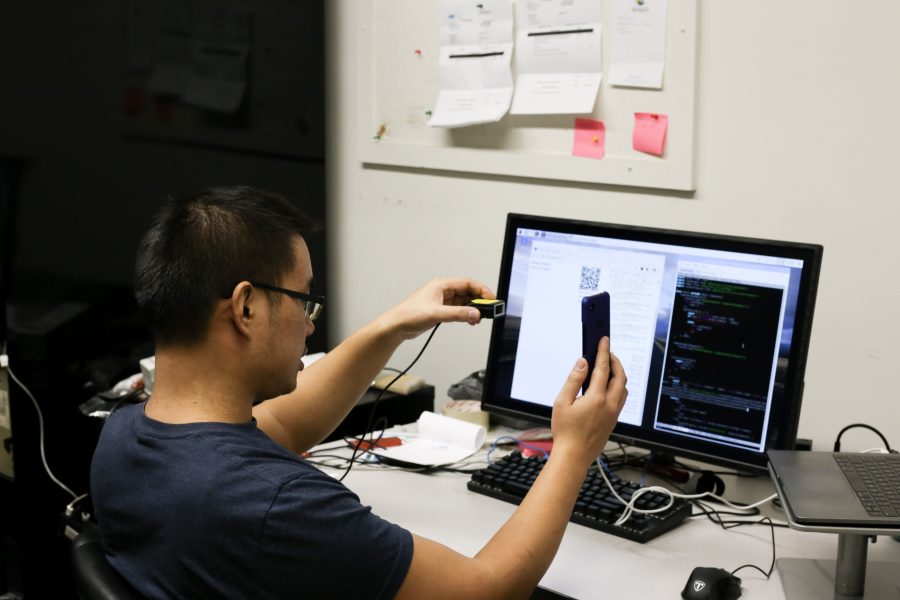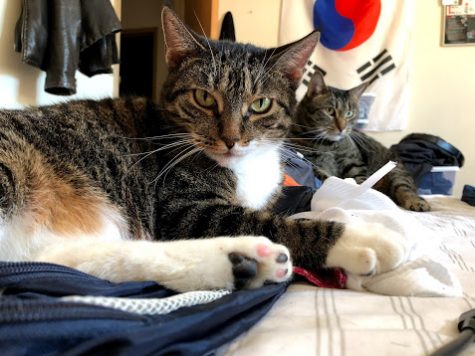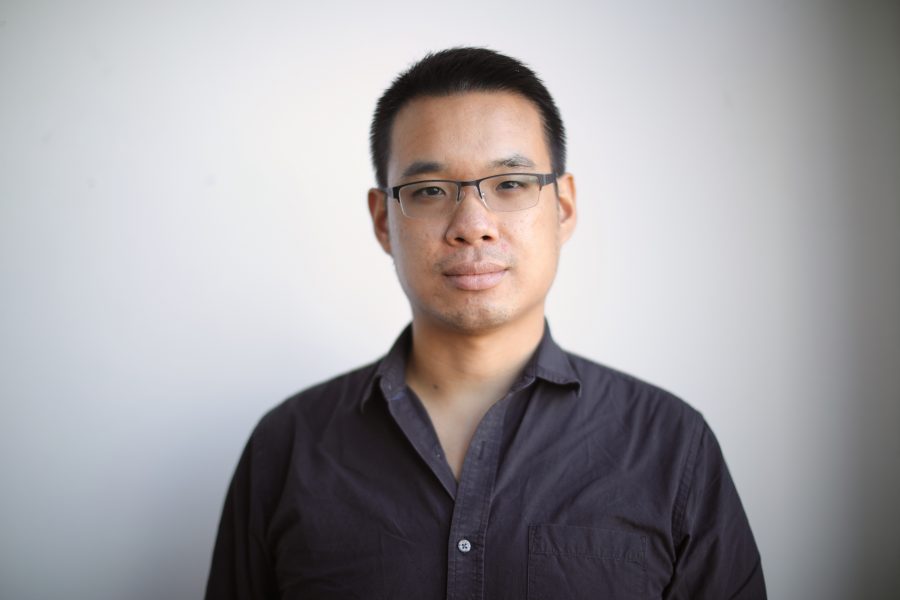Throughout the winter of 2011, a small, brown cat with black stripes would approach students who entered Brooklyn College and greet them with a rub against their legs and a friendly purr. But after a polite pet, most would walk to their classes and continue about their day, leaving her at the door to face the cold alone.
Some students might have thought about taking that cat in. But only one did. Now a Steinhardt graduate student, his name is Jon Chin.
Like in so many other aspects of his life, when Jon saw that cat — which he named Sonnet and still has — out there alone, he didn’t think he acted.
Jon is the CEO and founder of Share Meals, an app that allows students to share leftover meal swipes with those who might otherwise go hungry. He’s also a blackbelt in taekwondo, an English professor, a software engineer, a poet, a speaker and a martial arts teacher. Clearly, no one ever told Jon he had to pick one thing — or, if they did, he didn’t listen. Instead, he pursued each one of his passions to the highest levels, and didn’t stop until he got there.
A New York native, Jon left the city to pursue a triple — yes, triple — major in computer science, English and math at Boston University in 2003 — he later dropped to an English major and CS minor. At BU, he got into martial arts and became an instructor during his postgrad. In 2009, he started training with NYU’s taekwondo team.
It wasn’t until 2016, though, that he began studying English Education, Natural Language Processing and Machine Learning at Steinhardt. Prior to that, he received his MFA in poetry at Brooklyn College, during which time he taught English to nontraditional students at the College of New Rochelle.
Three years before he started taking classes at NYU, Jon began efforts to help disadvantaged students by starting Share Meals after he saw a student post on the Facebook page NYU Secrets about running out of meal swipes and not being able to afford food.
“I felt like I had to take action,” Jon said. “I saw a technical solution that could work a lot better than the current solution.”
A lot of students saw that post — and many did offer to help, telling the poster to DM them so they could share their meal swipes. Jon took it one step further, though. He thought, what if someone could make an app that connected students with extra meal swipes to those in need of food?
So, he coded one. In 24 hours.
Since then, the newest iteration of Share Meals has become used on over 400 universities, with almost 7,000 student users and over 3,500 lifetime meals shared. But Jon didn’t stop there.
In 2016, Jon was part of an NYU Food Insecurity Working Group, which debated the possibility of a food pantry and, eventually, led to the creation of the Courtesy Meals Program, which provides food-insecure students with 75 Dining Dollars free of charge.
Before that even happened, though, the working group was trying to get a read on how big of a problem food insecurity was at NYU. When it appeared that there was no data on the topic (and no one intended to gather it), Jon stepped up, having done his own survey earlier that year through social media.
“Everybody was just looking at each other like ‘no, we have no idea,’” Jon said. “I raised my hand and was like ‘yeah, four months ago I ran a survey and here are my numbers.’”
Although his survey collected data from multiple colleges, the majority of the responses were from NYU. Of those surveyed, 11.8% did not eat for an entire day at least once to save money and 14% often found it difficult to pay attention during class because they were hungry.
The founder of that working group, Senior Vice President of Student Affairs Marc Wais, said he considered Jon an informal leader of the group and one of the founding partners of the CMP. Wais said his initiative stood out from the start.
“Him actually trying to promote the importance and urgency of food insecurity, and at the same time backing it up with real, tangible, concrete action to address and mitigate the issue,” Wais said. “The big example is his creation of Share Meals.”
In 2017, Share Meals was the grand prize winner of the Stern 300k Entrepreneurs Challenge. A year later, the Share Meals team hosted a Love Through Food event, which fundraised $3,759 from four universities and packaged 12,534 meals that were mainly distributed to NYU students who needed them, with some going to other colleges.
Since then, Jon founded a Share Meals club, started the Open Kitchen project where students learn how to cook affordable, healthy meals and hosted virtual dialogues with student leaders looking for ways to combat food insecurity on their own campuses.
It’s those types of discussions and connections that take up the majority of Jon’s time. He said he spends as many as five hours a day emailing and video calling with administrators, students and anyone else who wants to work with him on a project.
Jon, who only takes one class a semester, sometimes finds himself feeling isolated. Some days, he spends most of his time coding away in his office at Hunter College or his home, watching Netflix on another computer screen as he works. It’s through Share Meals and his vast network of connections that Jon finds more personal interactions. Still, he rarely shares much about himself.
Margish Ramani, a 2019 CAS graduate, worked with Jon for over two years. But it wasn’t until he saw a Tedx Talk Jon gave that he learned Jon had struggled with food insecurity himself and had a stroke at one time. For me, I didn’t learn those things from Jon — or that he had given a Tedx Talk — until Margish mentioned it. And, when I later asked Jon about it, all he really had to say was “I mean as far as strokes go, nothing too dangerous.”
Margish, like many, connected with Jon over email. It was Jon’s influence that led him to present at a national convention, lead a community service Alternative Break group and speak at commencement on the topic of food insecurity.
Margish had emailed Jon because, as part of NYU Leadership Fellows assignment that required a project on a social issue, he and a team of four people (which included now Student Government Assembly Chairperson Jakiyah Bradley) decided to look into food insecurity at NYU.
After meeting Jon, who sent over massive amounts of information on the topic, Margish and Bradley decided most people didn’t know enough about food insecurity at NYU and hosted an informational session for their final project.
Margish worked with Jon for the following two years, and one thing that struck him was how many people he interacted with on a daily basis. He said Jon is not only willing, but excited to work with others.
“Jon is much more adaptable than he is visionary,” Margish said. “He’s not fixated on one idea or one solution, he’s always open to other people’s ideas, other people’s opinions. And I think that’s part of his success.”
One new idea Jon has had is a smart pantry. Part of why NYU went with the CMP and not a food pantry was due to the need for space and staff, two things that can be extremely expensive in New York City. Jon’s smart pantry is essentially a vending machine that Share Meals users can go to and, using a QR code on the app, “purchase” a meal (it would be free) from the vending machine.
The machine would allow others to actually buy meals, making people unaware if someone using it was food insecure, which reduces stigma, one of Jon’s priorities. It’d also take up little space and require no staff. Next semester, Jon plans to pilot the program at Hunter College.
Jon is currently speaking with the Office of Global Studies and Chartwells about adding one to the NYU London campus, and Gallatin Dean Susanne Wofford about adding one to the Washington Square campus.
However successful Jon has been, though, he’s had some pitfalls. He says it’s his being OK with those pitfalls that allows him to be successful.

“The same day that I dropped my triple major, that’s when I gave myself permission to fail,” Jon said. “I keep that in mind every time I do a new project. When I first started Share Meals, I coded the prototype in 24 hours and I said, ‘if this fails, then all I would have lost is 24 hours, and I’m OK with that.’”
It’s his willingness to try, to commit to those 24 hours knowing it could have been a waste, that has separated Jon and led to him becoming a leading voice for food-insecure students.
“This might be the teacher in me, but I think everybody has the potential to do that,” Jon tells me, wearing his “Ideas Never Sleep” shirt, a trophy from the 2017 Stern $300k Entrepreneurs Challenge. “Really, what’s lacking is having someone telling them, ‘it’s OK, it’s OK to stand out, it’s OK to take risks, it’s OK to fail’ and I think that once more people know that, they’re more willing to start initiatives like this.”
Maybe one of the most important things Jon does is be that person for others — the one who says it’s OK to fail, and works with you on how to succeed anyway.
“I got to speak at commencement because of his influence,” Margish said. “I would’ve never thought I would’ve remotely done something like that.”
At the end of my interview with Margish, he leaned back in his chair at Kimmel’s commuter lounge and stared at nothing, thinking about what else to say.
“A really interesting guy,” Margish said. “But I feel like I don’t really know him.”
Having interviewed him a little less than 10 times over the course of two years myself, I’ve rarely heard emotion enter his voice. I got emotional, though, when he talked about his cats.
That’s cats, plural — not long after Jon adopted Sonnet, he noticed her stomach begin to grow and, after taking her to a vet, found out that she was pregnant. He ended up giving away four of her five kittens, but he kept the runt of the litter.

For weeks, Jon took care of it as it suffered from an eye infection after being born. He held the cat, which he named St. Francis, wiping out his eye with a warm, wet towel.
When Jon talks about this act of kindness, he once again speaks in certainties — to him, he saw a problem to be solved, and the only logical thing to do was to solve it.
“I said, this cat, he’s the runt of the litter, he’s the weakest,” Jon said. “I gotta take care of him, I gotta keep him. And so I kept him.”
Email Victor Porcelli at [email protected].


























































































































































